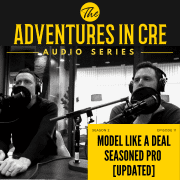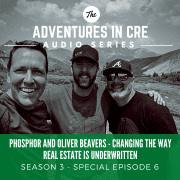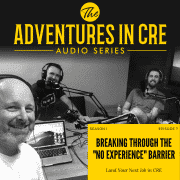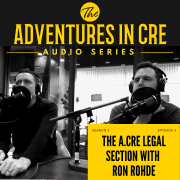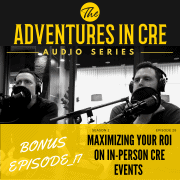Advice for Young CRE Professionals with Mike Strug
Adventures in CRE has always sought to provide value to CRE professionals. Mike Strug, our guest speaker today, has a similar goal. Mike is the founder of the Young Real Estate Professionals of New York (YREPNY), a commercial real estate networking group he helped start in the tri-state area in August 2001.
Mike has worked in commercial real estate for over 20 years. He currently works at BlackRock within a CMBS analytics team and has spent most of his career on the debt side of real estate. He was an originator/underwriter for Resource Real Estate Funding, IDBNY, Assurant, and TIAA-CREF.
Mike graduated with an MBA from Columbia Business School in 2001 with a concentration in Real Estate and Finance. Before going to business school, he worked in commercial real estate for three years in his native hometown of Houston, TX.
We’re very grateful for Mike’s willingness to speak with us this week about different pieces of advice for young CRE professionals. This episode talks about how to make connections as a just out-of-school CRE professional, how to network in a virtual environment, and the number one piece of advice for these young professionals.
Advice for Young CRE Professionals with Mike Strug
Watch as Spencer, Michael, Sam, and Mike Strug discuss careers in real estate and advice for the young CRE professional.
Or Listen to this Episode
Resources from this Episode
Episode Transcript – Advice for Young CRE Professionals
Announcer (00:01):
Welcome to the Adventures in CRE Audio Series, join Michael Belasco and Spencer Burton as they pull back the curtain on everything commercial real estate, and introduce you to some of the top minds in the industry. If you want to take your skills to the next level and be part of a growing community of CRE professionals across the world, this is for you.
Sam Carlson (00:25):
Hello and welcome back to the Adventures in CRE Audio Series. These episodes are sometimes intermittent, but when we get to do them, we’re always excited to do that and today is no exception. We are joined today by Mike Strug. Mike, how you doing?
Mike Strug (00:39):
Very good. How are you?
Sam Carlson (00:41):
We’re doing really good. We’re excited to have you. We’ve got a really interesting topic for you today, and to get us kind of going, I’m going to send it over to Spencer.
Spencer Burton (00:50):
Yeah. So, the topic for today is advice to young CRE professionals with Mike Strug. Mike we asked to join us because he’s got a really interesting background. He thinks about adding value to other people first and that’s… those are the type of people that we love to bring on, Mike, to the audio series. So, maybe I’ll start, kick it to you. And have you kind of share your background and maybe talk just briefly about the young real estate professionals in New York. We can dig into that a little bit more later in the episode, but if you wouldn’t mind just kind of giving us a two minute synopsis of who you are and then we can talk about advice that you have for young real estate professionals.
Mike Strug (01:34):
Yeah, yeah, for sure. And I really appreciate inviting me to be on this. It’s great. It’s great to give back to young professionals or college students or whoever. But I am a native Texan, I’m from Houston, and New Jersey, in the New York City area. And I started my commercial real estate career at age 23, with Prudential, now PGEN I believe it’s called-
Spencer Burton (01:56):
PGEN, yeah.
Mike Strug (01:56):
… but I was with them in Houston. For three years, three and a half years, I worked in commercial real estate down there, Cushman & Wakefield, couple of other companies. Eventually I got a… moved to New York, went to Columbia Business School and started my commercial real estate career in New York in 2001. But I was new to New York City and wanted to network, and back in 2001, there really wasn’t networking opportunities, at least casual ones, not in a bad way, it just didn’t exist 19 years ago.
Mike Strug (02:30):
There’s some fantastic organization close with Urban Land Institute, great organization, other ones that I was part of, which are also great. I decided just to get people to a pub in New York, and I got about 50 people, commercial real estate people, to a pub in New York, and we said, “Let’s do it again. And let’s do it again.” This was August of 2001, when it started, and after a year, we call ourselves Young Real Estate Professionals of New York. And we became an entity and we’ve been having events really for 19 years until the pandemic hit. At least once a month at a pub, a hundred to 160 people. Actually, we started doing New Jersey events too, the past couple of years as well. So, that’s kind of the brief story of the networking group.
Spencer Burton (03:16):
That’s a fascinating story. So, how did you as the young professional, in a city that you’re unfamiliar with, right? How did you meet people? This is probably a first nugget of advice for other young people who are trying to figure out, like, how do you start networking? How did you meet people at that stage?
Mike Strug (03:36):
Well, I’d just completed Columbia Business School MBA program. And basically, actually one of my goals was to get Columbia Business School, because that’s all I knew because I was obviously grad school, Columbia masters in the real estate program, Baruch College, NYU Stern, NYU master’s… I just knew people in their mid to upper twenties went to these different colleges, grad schools, and I guess was able to tell them, “Let’s go to Pig ‘n’ Whistle.” Like 50 of us met there and just from the… And then this group just blossomed. Every month people just told their friends, you’ve got to go to this event, and it just since then spread word of mouth. We don’t really advertise that much. We’re not in all the papers and all the websites. We’ve just been quietly having these events for a long time, even though a couple thousand people probably on our LinkedIn or email list right now.
Michael Belasco (04:31):
So, how big is the operation now? Is it just you? Do you have a group of people that are helping out?
Mike Strug (04:37):
Yeah. Yeah, it’s always a group of people, like four or five of us. It’s never just me. It’s been always been a group of people. Over the years it’s been a different group as some people have left the city or what have you, but it’s always been a group of people and I’ve always, every year I try to get new people, even younger. Now I’m in my forties, younger professionals in their twenties to help plan the events. This is a weird time for the group because we’ve always had live… sorry, live events in New York City or New Jersey. We’re starting to have some virtual events since the pandemic. It’s obviously not the same, but we’ll definitely be back up and running soon.
Mike Strug (05:13):
There’s been other things which I could go into how we’ve transitioned since the pandemic as well. But one of my goals is really to start a casual get together that didn’t cost a lot of money. Like our event is free to go to you, just buy your own drinks, you buy your own food, you kind of buy your own… well, drinks. And I just didn’t want to have that upfront charge. And I think that that was just a different philosophy for our group.
Spencer Burton (05:37):
As your career has grown in the last 19 years since you started the organization, what do you see as the primary benefits of gathering together with other professionals in this way?
Mike Strug (05:51):
Well, first of all, first of all, if you work on the deal side of the business, it’s great to meet people. Someone who’s been through now, I’ve been through a couple of downturns in my life, and been let go of, because of downturns in my life. You always want to build your network. Always just want to have… you lose your job, here’s the first 300 people you’re going to talk to the next day. Or maybe two days later, you’ll rest for a day, and then you started looking. And once you’ve been let go from a company, because of a downturn, you just never forget that, and I’m always striving to build a network. And it’s just like that. And it it’s good. It’s industry, something that we like, kind of like sports, you like sports, like talking to people about sports. I like commercial real estate. I like being around commercial real estate professionals. And it’s just a fun industry and fun get together.
Spencer Burton (06:48):
So, you had the benefit of a built-in network at Columbia and NYU, and you’re in the city with a lot of real estate professionals. What about those who don’t have that built in network? Maybe they’re at a non-target school… And I say non target, not in the traditional way, but in a way where there’s not a lot of real estate alumni within a school, or they’re in a smaller market, less institutional and so there are fewer… What are some thoughts on how those individuals can still connect with and build their network?
Mike Strug (07:21):
Yeah, it’s really just finding online, just Googling or finding what are the networking groups in your city and your location? There’s so many great organizations out there and just be a part of it. I mean, now it’s virtual, it’s even easier. We have people around the country now joining our group. And actually, usually college kids don’t come to our events because they’re physically not there in college and may not be 21. They can’t even to to our events. But now that we’re having virtual stuff, now college kids could come to stuff. So, it’s really finding what’s out there. There’s so many smaller groups now, there’s multifamily real estate groups and virtual this, virtual that. There’s a lot of opportunities, I think now, to network.
Sam Carlson (08:10):
I wanted to maybe just go back a little bit. So, you were talking about when you first came out of school, you were looking and you were… I think you were in New York, you didn’t know a ton of people, you were looking for opportunity. Was the goal of just meeting together just to build your network and start collaborating with some people? Was there a goal there? Did you say, “Hey, someday I want to have this big network of folks,” or did you just say, “Hey, I need some support right now,” and then it kind of morphed into where it is today? Or what was the initial goal, I guess?
Mike Strug (08:45):
It really was I wanted to start get togethers, obviously business school was very social, so now that I was in the workforce in New York, I wanted to keep that going. And it was a really an outlet for me to, A… well, first of all, I became a lender, I was at TIAA-CREF, so I needed to bring in business, but also just wanted to build my network of people in commercial real estate. And really, after the first few events, I didn’t know this would be a thing 19 years later, I really just thought… We just kept going and kept it going. Actually the second event would have been the day after 9/11, and so canceled the event and we had one the next month. We’ve had one every month until COVID hit.
Mike Strug (09:33):
But it was really initially just to have fun and meet people and expand your network. And then a year later we said we’re going to get this going. And I think at one point my goal, if we could just last five years, it’d be amazing. Then I said 10 years… Because if I think about a legacy going back, it’s not just the networking, it’s how many people found jobs through the group, either through me or just through the group or from networking? How many people have gotten deals through it? And so many other things. It’s been incredible. Friendships as well.
Sam Carlson (10:09):
And today is it… I mean, as far as the structure and how you actually… Outside of COVID, today is the structure pretty formal or is it… is there a loose aspect to it still? Or how do you manage that today?
Mike Strug (10:25):
Well, I mean, it’s always been pretty loose. I mean, I kept it free to go to the events and we haven’t… First of all, in New York City, I’ve always said that just incredible network of pubs and venues and they love our group because we have events. We would have events on Tuesday or Wednesday night, and off night in New York City and nice group of people, not loud music. And the venues would love us, because we’d bring in 150 people on a Tuesday night. And so, it was always a win-win for the clubs or pubs that we went to. And I mean, since it’s been virtual, it’s been tough. We’ve had some virtual events, once or twice a month, it’s not the same, but we’re just… like everyone else, we’re trying to figure out what’s the next step.
Mike Strug (11:11):
One thing we’ve done is mentoring. YREP, the group, had a summer workshop for college kids. It was something that just started last second, this past summer, probably we’ll do it again next summer. Way for college kids to learn real estate, to meet real estate professionals during the summer, while they’re at their internships or while they’re on taking other classes. So, that may be a thing that we’ll have in the future again.
Spencer Burton (11:40):
Well, I find it fascinating. That you’ve kept this going for 19 years and what a great benefit it is to those who are members of YREP. As you think about young professionals that are out there… so, I’m thinking those who are out of coming out of undergrad or coming out of a grad school program, maybe they’re a couple of years into their program, and they’re not exactly on the path that they’d want. As you think about advice for those individuals, what would be the biggest piece of advice that you’d offer?
Mike Strug (12:11):
Well, I mean, I get this question… exact question a lot, and it’s such a great question. I look back now at my career, it’s been about 22 years, is that I think a lot of kids… because I’ve talked to a lot of college kids, is they worry about the first job, the first job, and this, and this, but the truth is you’re going to learn more from 22 to 26 than you do at 18 to 22. You’re going to go to Chicago, LA, Houston, New York, New Jersey, and you’re going to meet so many companies, not just the related and Heinz of the world, but there’s so many private equity firms, small firms, medium firms, and when you get to the city, whatever job you do, you could pivot in a year or two, if you want. You can leave your job, your first job, and build your next job. And it’s good to always network.
Mike Strug (12:55):
See, that’s another thing with networking. You learn about companies in your city or your location, and it helps you build your career. When you leave a company it’s not about… not a bad thing, you’re trying to promote yourself. So, I would always give advice, just always network and understand who’s out there, what companies are out there, friends with people, your alumni, your classmates, young professionals, because you want to pivot to companies to grow your career, whatever it is. And it’s good to know who’s out there.
Michael Belasco (13:32):
Yeah, I want to chime in here. So, it’s fairly straight forward, networking, it’s very important, there are the usual suspects. You have NAIOP, you have ULI, and then you come across organizations such as yours and on NAIOP and ULI, they’re not cheap, they cost money to go to. And if you’re lucky to have your company sponsor that or your school, it’s great. It’s worth the money to belong to these organizations. However, I want to get a little bit of your advice for some… for people who might want to start something that you did yourself, right? Like you were young, you were like, “How could I network? How can I get out there? It doesn’t have to cost me money. There’s a group of people out here that would come and just congregate for free.”
Michael Belasco (14:18):
I could picture this type of a group that you started in almost every major city and even minor, secondary cities. What’s some advice you’d give to people who are hearing this, and like, “You know what? I should probably start this in Nashville. I should start this in LA,” or any other city? Just curious to hear like how it started and some advice you could give to others that might want to push a similar agenda or similar concept that you have in New York?
Mike Strug (14:42):
Yeah. Well, first of all, there are this entity in other cities, in a few other cities and some, I suppose, by coincidence back then. But some cities do have this similar group, actually, I think with the same name. A couple of cities have called me over the years and say, “How do we start an event?” And it’s really about it’s working with your city. I mean, anyone can start one and invite 10 to 20 people, have them invite someone, go to a pub. I mean, at least when you’re allowed to, when the… in a perfect world, go to a pub or something and get 20, 30 people and just build momentum. We started with 40, 50 people first time and it just spread word of mouth basically. And that’s all it takes.
Mike Strug (15:27):
You could keep it simple. You don’t have fancy websites and all that. You could just keep it simple at first and just build it.
Michael Belasco (15:35):
But somebody has to keep the momentum going, right?
Mike Strug (15:37):
Right.
Michael Belasco (15:38):
You got to have that first event and it could have died. There was something about it that energizes you to keep that going. And you made it what it is, so I mean, you guys have a logo and… you add things and it’s grown and that I find… I think is amazing. You’ve done this all while holding down a full-time job, growing your career, and excelling within the industry itself. So, it’s not a full-time thing for you. This is something you’re able to do-
Mike Strug (16:04):
Right.
Michael Belasco (16:04):
… to the benefit of everybody in your area, to the benefit of everybody in the industry that lives in and around New York City.
Mike Strug (16:11):
Right, right, right. And it’s fun, especially here in New York where, believe it or not, most people come to the events are not necessarily New Yorkers. Half the people here are, like me, from Texas, California, Pittsburgh, you name it. It’s kind of fun where we’re all at a network event and you’re meeting people, not just in your city, you’re meeting people from around the country, if not world at our events and that’s been special too. Because a lot of people based in New York work in nationwide commercial real estate. I’ve always worked in nationwide commercial real estate, so I’m able to meet someone at my event who’s from LA originally, and I could be looking at a deal in Santa Monica and it’s great. I could be able to talk with them. It makes it special.
Mike Strug (16:50):
But yeah, you’re right, anyone can start a similar group and similar concept, and virtually or live, and really be able to meet people. All the other groups you mentioned that cost, I mean, those are great groups that I’ve been a part of too, which are fantastic, but you’re right, it could be something simple like this.
Spencer Burton (17:08):
Yeah. So, you’ve brought up virtual several times. Obviously, I mean, here we are. Our audio series is generally in-person and here we are instead with… talking virtually. First off, a question for YREP what have you done now in a COVID era? Are you holding virtual events or have you focused on other efforts? Talk to us about that?
Mike Strug (17:33):
Yeah, yeah. I mean, basically we’ve had a couple of virtual events, maybe… more than a couple, we’ve probably had one or two a month, similar type of Zoom-type thing. And the crowds have been smaller, anywhere from 15 to 30 people. It’s still so fun. I mean, still meeting people. And we’ll continue that for now. We’re trying to figure out if we can even have a small event here in New Jersey or in New York, we’ll see when we can do that. But we’re trying to do some virtual ones. We haven’t had a round table discussion yet, we probably will one day. What I do sometimes though, I do tell our group members about other things going on. There are a lot of great virtual events going on nationally. I do try to get the word out about other events as well.
Spencer Burton (18:23):
So, how do you network in a virtual setting? Are you doing breakout rooms or is it just everyone’s introducing themselves? How does that work exactly?
Mike Strug (18:34):
Yeah, either breakout rooms in Zoom or go to remo.co, which another website to meet people. It’s really just that. At least it’s all I’ve used so far.
Spencer Burton (18:44):
Okay. So, I’ve… and it’s a bit of a leading question because I have some advice I want to offer on this as well. Michael and I participated yesterday and in kind of a speaking event with a university. And there’s some, let’s call it Zoom etiquette, but as you think about Zoom etiquette, like what makes you… what gives you a foot forward or a good first impression? Well, let’s talk a little bit about that. So, what are your thoughts on Zoom etiquette? In-person we all have, right? We’ve learned since we were in school, it’s like, these are the things you do and you don’t do in a in-person networking event, so what about Zoom? What are your thoughts there?
Mike Strug (19:25):
Yeah, no, it’s funny because I’ve enjoyed the Zoom so far, because, first of all, I’m able to meet people nationwide. People have come and tried to join the YREP group, which is free if you go to the website at yrepny.org, and you can join today and it’s free. I’ve met so many people nationally through this and been able to go on Zoom. I would say if you’re in a Zoom meeting with six people or in a room, it’s tough because you want to talk with six people at once. I’d say try to have one conversation… Try not to have one conversation with one person, then if you do, you kind of have to break it up, so other people can talk too. I try to have a conversation that we all could talk about hotel sector right now, or retailers, or the Hudson Yards, something that all six of us could talk at the same time. Not that just two people focus on one deal. I try to get everyone involved together.
Spencer Burton (20:23):
Yeah. So, your advice, just to sum that, is in a small group setting, stick to one topic, be respectful of others, kind of what our mothers taught all of us, it’s like don’t speak out of turn.
Mike Strug (20:38):
Right, right.
Spencer Burton (20:39):
Other thoughts, Michael, what do you think about Zoom etiquette? Do you have any insights there?
Sam Carlson (20:51):
I said, Spencer, that’s a lob for you, Michael.
Michael Belasco (20:56):
I said, definitely do not dress formal. No, you still have to dress appropriately for whatever it is you’re going on Zoom for. I think, that still holds. Dress code’s been a little more relaxed lately on all meetings I’ve been on, across the board, from top to bottom. That’s, for me, a nice thing, I’m not super into like getting dressed up every day, so I like that. But it’s about your… to me, you said we’re on this university calls about 25 to 30 people, I don’t recall, and at least, if you’re going to be there, be paying attention. If you have to do something and it’s not like related to what is happening on Zoom, turn your camera off. It’s a large group setting, it’s understandable. It’s a big event.
Michael Belasco (21:48):
If you’re having a side conversation on you and you’re like looking away and you’re laughing and you’re doing things like that… and I’ve seen that, it’s, it’s very distracting I’d say, and unprofessional, and you don’t want to be that person doing that. And I’ve seen it more than once. So, know the audience, right? It’s the same thing in person, what you would do. Maybe you dress a little more comfortably, but…
Mike Strug (22:17):
Well, sometimes what I do too, is I go to the chat feature and I’ll chat to them privately and say, “Here’s my email address. Here’s my LinkedIn, whatever. Let’s talk afterwards, let’s talk tomorrow. I’d love to hear more about what you do at XYZ company.” I’ll just chat them. Or sometimes we’ll chat the whole room, “This is my email address and let’s talk offline,” just so… so then I don’t worry about if I can’t talk to the person, at least we’ll have a conversation the next day. And it’s been a great way to add to your network. When you’re on a Zoom call, let’s say with 20 people or 30 people, you should have LinkedIn open up on the second screen like I do, and just type them in and see what they do and maybe add them. And that’s another way to really build your network.
Spencer Burton (22:59):
Well, that’s a great piece of advice, which is leverage LinkedIn. The beauty of virtual is… and it’s a double-edged sword, but that you can multitask. Not multitask to the point where, to Michael’s point about you’re clearly distracted, like still be part of the conversation, but sometimes you’re curious, like, “I know that person, we’ve met before,” and you can quickly pull them up on LinkedIn and go, “That’s right. We did this deal together five years ago,” or what have you, or, “We actually went to school together.” So, that’s a really good piece of interesting advice. Sam, you were going to say something?
Sam Carlson (23:37):
Yeah. Well, I’ll kind of… because you kind of answered or you dovetailed into what I was going to say, but I had a previous question, and I think it kind of brings us back to this advice to young professionals. You started this group, it sounds like it’s amazing. I’m guessing one of the things that is amazing in a group is you kind of start rising to the level of that group. And so when you’ve got people that are doing awesome things, then it really either motivates you or through their experience, you learn faster, you have mentorship opportunities, things along those lines. And I’m wondering if you can talk to that? And then, as far as giving advice to people, I mean, obviously finding a mentor or something like that is a big piece, and is a group like yours, an appropriate setting to do so? So, maybe talk about some of the experiences you’ve had on learning, getting mentorship, things along those lines, and then what the best practices are to doing the same thing themselves?
Mike Strug (24:42):
Yeah. I mean, it’s funny when I started this group, I started in commercial real estate, I was always looking for mentors in the business. I was on the debt side, looking for mentors on the debt side. And a lot of people in our group were in their 30s too and 40s, and I was able to… they were able to help guide me. Then, as I got older, we kept this group going, now I’m kind of mentoring a lot of the 22 to 32 year olds who come to our events, whether they’re… maybe they’re changing jobs or so forth, they turn to me. But also what I’ve been able to do is, it’s not just me mentoring these people. It’s, I’m able to introduce them to other people in our network. So, when a 25 year old reaches out to me and says, “I’m looking to transition to a new job who do you know?” And all introduce him to 15 people the next day. And they’re all a part, and probably have been to our events, and that’s how I met them.
Mike Strug (25:36):
And so, through this group, with our help so many people find new jobs or build their careers. That’s been one of my goals is to… that’s another reason to build a network, so I could really help the next generation, just through people who I’ve met through this group. We don’t have an official mentor program and that’s something we should start. And we’ve been talking about it next year, starting an official mentor program. But for now we’re mentoring a lot of people just anyway,
Spencer Burton (26:07):
Yeah, that really resonates with me. So, one thing is mentorship either formal or informal? And I think all of us, we can look back at our careers and we have the… there’s those individuals, whether we call them a mentor or not, they had a big impact. And they’re still to this day, who you can turn to and they’ll give advice without any expectation of something in return. There’s something else that I’ve… and I learned this from… and he was a guest on our audio series a few months back, a guy named Lane Bean, a former F-16 pilot and just salt of the earth type of person. And he has this mantra about surrounding yourself… I think he calls them tens, but surrounding yourself with just exceptional people. And it reminds me of when I was young and my parents wanted me to hang out with the good crowd, not the bad crowd. In your career at the same thing.
Spencer Burton (26:59):
And so, if you’re aspiring to something, surround yourself with people who have either hit that or are working towards that same goal and a rising tide sort of mentality lists you together with those who you’re surrounded. And, by the way, a reason to join groups like YREP, right? You’re joining groups of individuals who have high expectations of themselves and those that they associate with with.
Mike Strug (27:27):
Right, right. And it’s all about, you’re right, surround yourself with positive people, and that’s what I do. I mean, you can meet great people in any city. You can meet nasty people in any city. But it’s about surrounding people with people who are… they help your career and want you to succeed and so forth. And that’s been the fun thing about this group, is I met so many people over the years and… whom I’ve helped or they’ve helped me and we’ve helped each other succeed. And that’s why we kept it going. It’s been a very positive environment. And again we don’t… There’s not like loud music there, it’s more of a positive environment and people having a good time.
Spencer Burton (28:13):
Well, look, congratulations. Yrepny.org. And now people across the country can join. And I think it’s just a phenomenal thing that you’ve done, Mike.
Mike Strug (28:25):
Thank you. Thank you.
Spencer Burton (28:26):
Thank you for coming on. Thank you for what you’ve done to benefit those in the industry.
Mike Strug (28:30):
Yeah, no, I really appreciate it. It’s been great. And again, now giving back to college students a lot, because a lot of college students can join now because it’s virtual. It’s great.
Sam Carlson (28:40):
Awesome. Well, thanks, thanks to you, Mike. We appreciate you. We appreciate obviously what you’re doing in your community and things along those lines. So, we appreciate that. And also everything you share with us today, that is absolutely phenomenal. So, thanks for coming. And to our listeners, thank you for listening, and we will see you on the next episode.
Announcer (29:00):
Thanks for tuning into this episode of the Adventures in CRE Audio Series. For show notes and additional resources, head over to www.adventuresincre.com/audioseries. Would you like to learn real estate financial modeling in a matter of weeks and do it with zero guesswork? If so, the ACRE Accelerator is for you. The Accelerator is a step-by-step case-based program, designed to teach you exactly what you need to know, and in the order you need to know it. So you can gain both the knowledge and experience to take your career to the next level. To see if the Accelerator is right for you, go to www.adventuresincre.com/accelerator.
Frequently Asked Questions about Advice for Young CRE Professionals with Mike Strug

